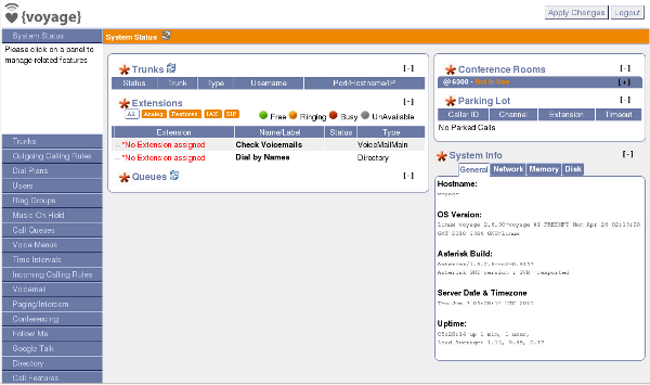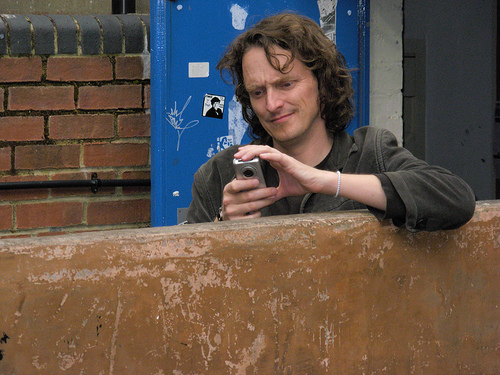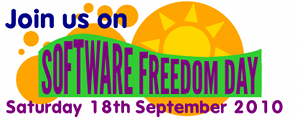The Digital Challenge is dead, but Momentum Group is harder to kill than a vampire
Yesterday, Rich, Jules and yours truly were representing Bristol Wireless at a Connecting Bristol event (news passim) at the Watershed entitled ‘The Digital Challenge is Over – The Digital Opportunity is Here’. It was good to see some old (not in the geriatric sense. Ed.), familiar faces: Kevin and Stephen from Connecting Bristol, Stephen Dodson from DC10plus, Carolyn and Makala from Knowle West Media Centre, Dick from the Watershed, etc. It was also good to see some new, familiar faces too, such as Mark Taylor, CEO of Sirius Corporation, who are going to be opening a Bristol office in the New Year. The event was being actively reported via Twitter by half a dozen fleet-fingered folk in the room using the hashtags #digifuturesbris and #digifutures.

After attendees were hushed to silence by Dick, the event kicked off with a short address by Bristol City Council leader Barbara Janke, after which there was a rapid series of presentations (with added ‘Death by Powerpoint’. Ed.) from Stephen Hilton, Steve Dodson, KWMC’s Carolyn and Makala and iShed‘s Victoria Tillotson looking at what had been achieved both locally and nationally during the Digital Challenge. Your scribe was amazed that over 3 years had elapsed since we worked on Bristol’s bid. The final presentation – with no slides – came from Andy Parkhouse from Delib making, inter alia, a passionate plea for decent broadband and the sincere wish that decent connectivity becomes regarded as a utility.
During the presentations we were reminded that Bristol’s Digital Challenge bid was the culmination of 18 months work, which began in July 2005 with the first gathering of the Digital Bristol Momentum Group – a group whose ‘open source’ philosophy and ways of working secured cross-party political support and a commitment from business, academia and the wider community to making Bristol the country’s leading digital city.
The floor was then thrown open to discussion from the floor and this covered a broad range of topics looking towards the future, with such contemporary issues as Wikileaks and public spending cuts both getting a look-in. Next generation access (aka ‘superfast’ broadband) featured prominently here. Telco giant BT was criticised for its (lack of) progress to date, to which, when given the right of reply, the man from BT talked of forthcoming trials of 40 Mb/s and 100 Mb/s services. Dick Penny raised the matter of the regulatory environment with BT, asking whether an amendment in building regulations to stipulate fibre to the home would expedite the roll-out of better broadband access. I seem to recall the answer was a qualified maybe. There role of business loomed large in the discussion, although a couple of speakers mentioned the importance of not disregarding the interests of communities, either physical (‘neighbourhoods’ in council-speak) or communities of interest (which are legion).
Before adjourning for a glass of Watershed rouge, the meeting resoundingly agreed that the Momentum Group’s momentum should be sustained with quarterly sessions. So, see you all in 3 months’ time. 😀
Footnote: if you’re wondering about the vampire references, Stephen Dodson was afraid to come to Bristol for fear of running into all the vampires, having watched the box set of TV series ‘Being Human’, which was filmed locally.

 A couple of days ago, we received a donation of a rather smart machine; this will be refurbished and
A couple of days ago, we received a donation of a rather smart machine; this will be refurbished and 
 An email’s arrived from
An email’s arrived from 

 News reaches the lab that the Digital Challenge, set up nationwide some three years ago to promote digital inclusion, has come to an end.
News reaches the lab that the Digital Challenge, set up nationwide some three years ago to promote digital inclusion, has come to an end.
 Bristol Wireless will be officially reopening the Computer Room at
Bristol Wireless will be officially reopening the Computer Room at 
 Yesterday afternoon your correspondent was in the Bristol Wireless lab in Hamilton House on Bristol’s Stokes Croft, catching up on some pressing Bristol Wireless administration and updating the blog, when one of life’s little irritants occurred. Hamilton House’s occasional phantom drummer started banging away (why do people who should never be allowed near percussion always end up playing it? Ed.) loudly and persistently. Anyway, after about 15 minutes, yours truly was getting really aggravated by it and fired off the following brief bit of invective via his
Yesterday afternoon your correspondent was in the Bristol Wireless lab in Hamilton House on Bristol’s Stokes Croft, catching up on some pressing Bristol Wireless administration and updating the blog, when one of life’s little irritants occurred. Hamilton House’s occasional phantom drummer started banging away (why do people who should never be allowed near percussion always end up playing it? Ed.) loudly and persistently. Anyway, after about 15 minutes, yours truly was getting really aggravated by it and fired off the following brief bit of invective via his 